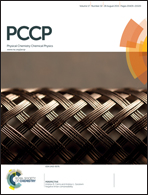A detailed study of cholinium chloride and levulinic acid deep eutectic solvent system for CO2 capture via experimental and molecular simulation approaches†
Abstract
Choline chloride + levulinic acid deep eutectic solvent is studied as a suitable material for CO2 capturing purposes. The most relevant physicochemical properties of this solvent are reported together with the CO2 solubility as a function of temperature. The corrosivity of this solvent is studied showing better performance than amine-based solvents. A theoretical study using both density functional theory and molecular dynamics approaches is carried out to analyze the properties of this fluid from the nanoscopic viewpoint, and their relationship with the macroscopic behavior of the system and its ability for CO2 capturing. The behavior of the liquid–gas interface is also studied and its role on the CO2 absorption mechanism is analyzed. The reported combined experimental and theoretical approach leads to a complete picture of the behavior of this new sorbent with regard to CO2, which together with its low cost, and the suitable environmental and toxicological properties of this solvent, lead to a promising candidate for CO2 capturing technological applications.


 Please wait while we load your content...
Please wait while we load your content...